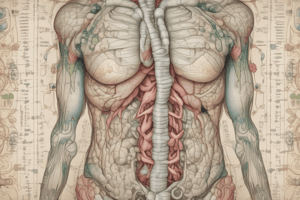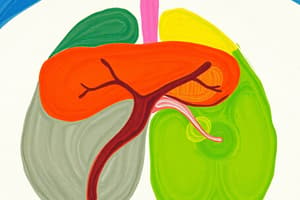Podcast
Questions and Answers
Match the following hormones with their function:
Match the following hormones with their function:
Insulin (Pancreatic Islets) = Promotes the absorption of glucose into cells for energy production Growth Hormone (Anterior Pituitary) = Stimulates growth of cartilage and bone in children Cortisol (Adrenal Cortex) = Regulates stress response and metabolism Thyroxine (Thyroid Gland) = Controls metabolic rate and energy production
Match the following hormones with their role in body functioning:
Match the following hormones with their role in body functioning:
Insulin (Pancreatic Islets) = Prevents hyperglycemia and hypoglycemia by regulating blood sugar levels Growth Hormone (Anterior Pituitary) = Supports cell division and tissue repair in adults Estrogen (Ovaries) = Regulates menstrual cycle and secondary sexual characteristics Testosterone (Testes) = Promotes muscle growth and development of male reproductive system
Match the following hormones with their impact on physiological processes:
Match the following hormones with their impact on physiological processes:
Insulin (Pancreatic Islets) = Aids in growth promotion and tissue repair Growth Hormone (Anterior Pituitary) = Contributes to metabolism regulation by breaking down lipids and proteins Adrenaline (Adrenal Medulla) = Triggers fight-or-flight response in stressful situations Progesterone (Ovaries) = Supports pregnancy by preparing the uterus for implantation
Match the following hormones with their influence on specific body functions:
Match the following hormones with their influence on specific body functions:
Match the following hormones with their contribution to homeostasis:
Match the following hormones with their contribution to homeostasis:
Match the following hormones with their functions:
Match the following hormones with their functions:
Match the following hormones with their specific roles:
Match the following hormones with their specific roles:
Match the following glands with the hormones they produce:
Match the following glands with the hormones they produce:
Match the following hormones with their effects on the body:
Match the following hormones with their effects on the body:
Match the following functions with the hormones responsible:
Match the following functions with the hormones responsible:
Flashcards are hidden until you start studying
Study Notes
Functions of Endocrine Hormones
Endocrine glands produce hormones, chemical messengers that play crucial roles in regulating various physiological processes within the body. These hormones function by interacting with specific target cells to initiate responses and maintain homeostasis. Some essential functions of endocrine hormones include growth promotion, tissue repair, stress response, metabolic regulation, sexual development, immune system modulation, and muscle growth. Each hormone serves its unique role to ensure optimal body functioning. Below are some examples of the functions of specific endocrine hormones and their associated glands.
Insulin (Pancreatic Islets)
Insulin is primarily produced by beta cells of the pancreatic islets and plays an essential role in glucose regulation. It promotes the absorption of glucose into skeletal muscles, fatty tissue, liver, and other cells throughout the body. This helps maintain blood sugar levels within a healthy range, preventing hyperglycemia (high blood sugar) and hypoglycemia (low blood sugar).
Growth Hormone (Anterior Pituitary)
Growth hormone, secreted by the anterior pituitary gland, stimulates the growth of cartilage and bone in children, resulting in linear growth. It also contributes to metabolism regulation, stimulating the breakdown of lipids and proteins for energy production. Additionally, it promotes cell division and tissue repair in adults, supporting overall wellbeing.
Thyroid Hormones (Thyroid Gland)
Thyroid hormones, triiodothyronine (T3) and thyroxine (T4), are released from the thyroid gland and play crucial roles in regulating metabolism, heart rate, and brain development. They promote oxidative reactions that generate heat, enhance protein synthesis, and contribute to efficient use of energy within the body.
Adrenocortical Steroids (Adrenal Cortex)
The outer layer of the adrenal gland produces steroid hormones called corticosteroids, which include mineralocorticoids, glucocorticoids, and sex hormone precursors. These hormones manage electrolyte balance, stress response, inflammation reduction, and immune system activation.
Gonadal Steroids (Testes, Ovaries)
In males, testosterone is produced by Leydig cells in the testes and supports libido, aggression, and secondary sexual characteristics. Testosterone also stimulates the conversion of cholesterol into more potent hormones such as estrogen in both men and women. In females, the ovaries produce estradiol, estriol, and progesterone, which regulate menstrual cycles, pregnancy, and ovulation.
These examples illustrate how various endocrine hormones work together to maintain homeostasis and support diverse physiological processes within the body.
Studying That Suits You
Use AI to generate personalized quizzes and flashcards to suit your learning preferences.




